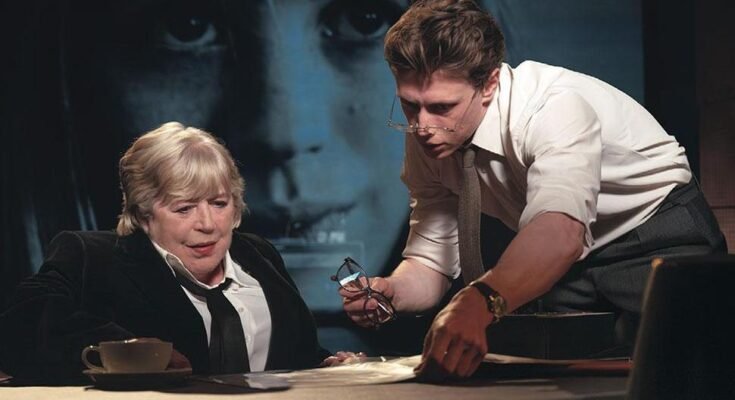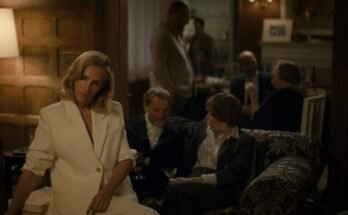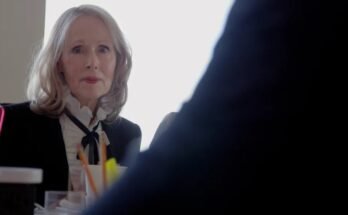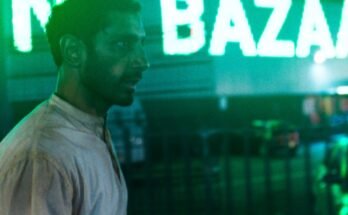In his autobiography, Keith Richards described “as tears pass”, a disarming ballad that he and Mick Jagger composed under constraint, as “a terrible piece of tripe”. You can see why, given the potential for exaggerated upgrade in his lullaby type melody and words about the playing children and the tears that fall. But everything is in the delivery, and as originally recorded by a Marianne Faithful, then 17 years old, sentimentality turns into a trembling sadness. Her voice had this effect, to deepen and by painful ordinary words, whether in its pure adolescent form and Flatey or the sandy grater and ravaged by drug addiction, it has become aging. And there is still – both frankly speaking and finally, beautifully, singing only a few months before his death – in “Broken English”, Iain Forsthy and Jane Pollard devoted homage to the singer -songwriter -Iconoclastic British interpreter.
Anyone who knows the cinema of Forsyth and Pollard – including the portrait of Nick Cave, nominated Moody, nominated in 2014, “20,000 days on earth” and the barely categorizable musical from last year “The Extraordinary Miss Flower” – will not expect a Standard Rock Document in Toronto. After an introduction to the sadness of the writing sequences, following Faithfull of her ethereal arrival as a folk singer in the 1960s to her supposed fall from the next decade to her altered return, the film defines her offset stand. Tilda Swinton, nothing less, is inaugurated as austere director of the Ministry of Not Forget, an imaginary institution with shadows, dust and analog office fittings, and names Faithfull as his first research project.
“What we are looking for are the memories, what we hope is the resonance,” explains the manager, more or less summarizing the objectives of each Docmaker who run through the archives when they find the form of their film. She instructs her assistant to Breaver, played by George Mackay, while he is preparing to question Faithfull about his life and his career – an artificial fiction configuration for what is equivalent to an interview of celebrity on unexpected celebrity, which is all the more surprising for the way youth and the septuagenan musician are immediately and palpable. In the character or other, Mackay proves a warmly united interviewer and a generous listener, and the non-kept and often very funny reflections that he draws faithful on herself and the times when she crossed is the richest asset of the film.
Faithfull certainly remembers an era when it was not so kindly treated in the interviews. The well -selected archive equipment represents the cheeky misogyny which has colored the way it had been spoken – and spoke – for a large part of her career. Faithfull herself turns to the promotional copy with pink and infantilizing eyes commanded by the label for her first 1965 album: “Angels swirling in the wind”, she reads, barely removing a sniffing. “Well, it’s bullshit.”
Such a purple prose is more complementary, at least, than the big titles of the tabloids that she inspired when she fell with the Rolling Stones and the rock scene that accompanies her, which presented her as a little more than a surxcluse group, devoid of agency and talent – and exploited the widely disseminated image of her nude in a furs Richards. A mounting of choices, cut by editor Luke Clayton Thompson to a growing foam of fury, shows a most male talk show procession that harasses the faithful of his business and his drug consumption. She looks at him with an upride of shoulders: “Despite all these stupid people and their stupid questions, I actually make a good life, so fuck them.”
She is not always as recalcitrant, and can be struck by the self-efficiency of her mistakes and her long battle against drug addiction, describing dependence in a poignant way as “to take all your rage on yourself”. When Mackay observes that what she went through would have shattered a lot of people, she resists Auto-Mythiz: “Well, maybe it broke me,” she replies.
His frankness and his lack of pretension as an interviewer can make certain devices of the film outside this main conversation, a little affected and superficial in comparison. A feminist “debate” on the heritage of Faithfull, moderated by the British DJ Edith Bowman and filmmaker Sophie Fiennes, represents only a little more than a love of the round table, deserved but not particularly analytical, with participants like the actor Sienna Guillory and the musician Natasha Khan among those who offer personal values to legend. Likewise, the framework of the Ministry of Not Forget, despite its initial Kafkaesque atmospheres, is hardly more than a formal distraction, not particularly suitable for the film in a thematic or stylistic way.
What persists the longest of “Broken English”, despite its playful and ambition, are the elements of meat and potatoes of any documentary of good music: not only the presence of Faithfull as interviewed, but a host of lively musical performances both archives and contemporary. On this last front, a team of ACE musicians, whose unrelated composers Rob Ellis and Warren Ellis, accompany several skillfully chosen reinterpretations of the pieces of faithful key: Beth Orton sounds extremely broken on “Times Square”, while Courtney Love is complex abrasive and composed of “Times Square”.
None, however, can go beyond a peak and devastating performance of Faithfull herself, little supported by Warren Ellis and Nick Cave, on “Misunderstanding”, a song from her 2018 album “Negative Capability” – his voice both both that I do not play on lyrics like “Errets Are Sless / Misunding. Faithful While the film was still in production; the performance was not supposed to be its last recorded.



